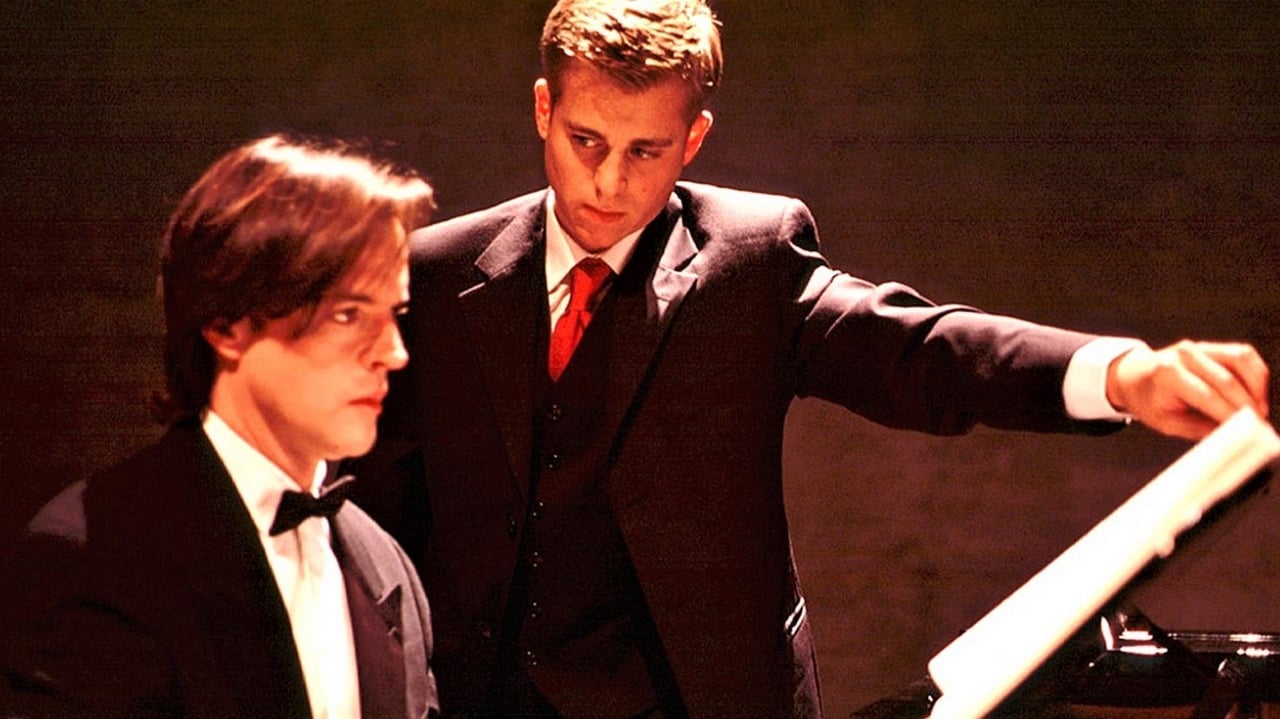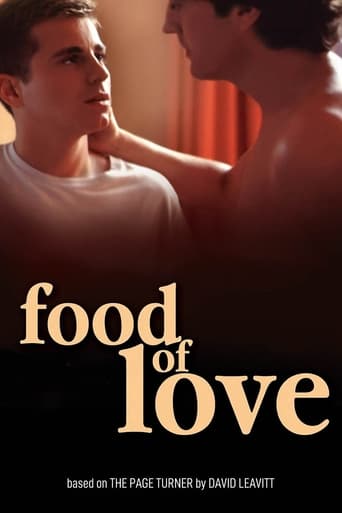

Purely Joyful Movie!
... View MoreAm I Missing Something?
... View MoreIt is an exhilarating, distressing, funny and profound film, with one of the more memorable film scores in years,
... View MoreThis is one of the best movies I’ve seen in a very long time. You have to go and see this on the big screen.
... View MoreWith these words, moued by that wise witch of a piano teacher, Geraldine McEwan, the plot of the film is set.Not having read David Leavitt's "Page-Turner" which may contain different keys to the main character, I am hampered by seeing Bishop's Paul Porterfield through the eyes of Ventura Pons.He's a sacrificial lamb. An initiate to the rites of love. A vessel to be filled.He's an object.As it is, his character shows a reluctance in every stage, from the sexual to the professional. Is he really gay? Is he really interested in piano? Is he really that much in love with Paul Rhys' character? The central theme of the film should've been love, and instead it turns out to be something a little more tawdry -- the pursuit of the freshest of meat by all concerned, a virginal character played with wide-eyed neutrality by Bishop.There are films which show a sensitivity to tackling the necessities of homosexual themes (Will Smith in _Six Degrees of Separation_ comes to mind). I'm not sure if Ventura was aiming this as his introduction to a wider, mostly American audience (hence the accent changes of the British cast), and thus had to rein something in to get that "R" rating, but his gay scenes were laughable. One bare bottom scene after the other.They were like a bad note in a piano recital, which the audience forgives because they anticipate the whole sweep of the work.Added to the shrill performance of Juliet Stevenson (playing, what I imagine, is her idea of a provincial American housewife -- cartoonish and unidimensional, with accent to boot), the film only flows when Rhys is present on screen.He and Paul should've hogged the camera time, not Paul and his mother.This is a failure of directing, as much as script-writing.Ventura Pons suffers that typical Spanish director's affectation of indulging himself in films, to the detriment of the storytelling.He wants to show off his beloved Barcelona, which he does. He wants to show off the maturing of a gay boy, which he does. He wants to show the absence of love in other characters' lives, which he does in the dog and divorce themes. He even wants to show how insipid Americans are said to be abroad, and he does that too.None of it work. As one example, Barcelona is not a secondary character, as so often happens in Allenesque fashion in some films. _Food of Love_ could've taken place with equal effectiveness in Granada, or indeed, San Francisco in its entirety.At every turn this film is tentative. I want to imagine it's a misreading of cultures, which sometimes works (Visconti and his German mania) but in this case, it truly doesn't.I could barely believe such accomplished actors as Stevenson, and Corduner were giving such stilted, even amateurish performances. Only McEwan salvaged a little dignity in her scenes, which wasn't difficult since she was the only truly honest person in the piece. (I also read that she never believed she was good with accents, but that Food of Love and Pure changed her mind. Sorry to say, but her accent was like a tortured Balkan gypsy somehow landed in Glasgow)I wanted to like this film, as I am passionate about piano. I was willing to be seduced, like a young Bishop.I couldn't help but to think at the end that Pons had been too much of a vampire with his audience, that need for artists to use others to further their talent, even to the point of leaving you dry at the end.Should people require a rating, I give it 2 1/2 stars out of 10.
... View MoreWhile there are a few cringe-worthy moments in this movie adaption of the novel ''the page turner'' this does not mar an otherwise good movie about an American teenager coming to terms with his homosexuality. Ganted,towards the end there are some soap opera style moments and Juliet's portrayal of the mother does tend to overact on occasion,however there are some very powerful if subtle emotional elements to ''food of love''. In particular when Paul reluctantly offers himself with little resistance to Richard's sleazy lover/manager's desire for oral excitement;the camera pans around to a picture of Richard and then back to Paul for a close-up of the deeply sad longing expression. The character of Richard who Paul is besotted by is interesting as he doesn't portray the gay stereotype as it works well against the more pretty-boy stereotype look of Paul.Although Richard's shallowness does come through towards the end as we find out that despite his ''normal'' outward intellectual manner he is just as sleazy as his partner/manager,a character I could have done with much less of. On the whole the editing is above average,the love scenes between Richard and Paul were enough to titillate for those viewers who seek such content in such films,and there were enough of them to compliment the storyline.One of these scenes was another example of the subtle yet powerful emotional elements in the film,as the viewer is lead to believe from the beginning that Paul is still a virgin when he meets Richard(having a mother such as he did in the movie would be almost enough to put you off women forever!),and the crushing of the ice cube during the love-making told us that this was no longer the case. I would definitely suggest at least hiring a copy of ''food of love'' and then decide if you want to own to watch again and again,chances are you will want to.
... View MoreI wanted so much to like this film, and I tried very hard to do so. But it is so inept, and has so many flaws, it is hard to know where to begin.The basic story is simple enough: piano student Paul is seduced by and falls in love with his idol, fortyish concert pianist Richard; he gets dumped inexplicably and spends the rest of the film trying to make sense of it. But add these extra ingredients -- Paul's neurotic mother also falling for the pianist, Richard's lover/manager seducing Paul while the boy is being kept by yet another older man -- and you have a rather heady Freudian stew, indeed.What these noxious, self-absorbed characters have in common, keeping the handsome 18-year-old confused and depressed, is their duplicity. Nobody tells Paul the truth, rendering him unable to make a decision in his own interest. His beauty makes him desirable. His ingenuous nature makes him an easy mark.The dialogue is oddly disjointed though lifted directly from David Leavitt's well-written novel, The Page Turner. For some reason, about half of Mr. Leavitt's lines have been deleted, making those that remain a crazy-quilt of non-sequiturs. Adding to the confusion are British actors playing American refracted through the eyes and ears of a Spanish director. Then there are the Spanish actors who have learned their lines phonetically, wildly inflecting words incorrectly. Finally, a classical music consultant could have insured the proper pronunciation of composers' names, or pointed out that most of the pieces Paul plays are embarrassingly inappropriate.What the film does do well is to depict the haute-gay classical music demi-monde of New York, and the predatory older men who rule from lofty Central Park West enclaves. This exclusive oligarchy devours the seemingly unlimited supply of hopeful young artists, like Paul, who want to succeed but cannot due to inexperience and inaptitude for the game. A 'civilized' veneer covers, but never quite hides, the self-serving artistic Darwinism.Exquisite Kevin Bishop, who plays Paul so perfectly, is a real find. He has a low-key style, lovely body, and astonishing blue eyes. Barcelona is exotic, the photography is beautiful, and the original score is well done, but the DVD itself has problems. The dialogue is somewhat out of sync, is overly loud in some places (mainly due to Juliet Stevenson's histrionics), and nearly inaudible in others.
... View MoreIf the story had been pared down to an examination of the central two characters, rather than lavished with grotesque, utterly implausible and terribly acted caricatures, then this film might have had some potential for being saved from itself. As it stands it has little.There is no great skill to being catty and negative, but seeing as Food of Love is, by its shoddiness and carelessness an open invitation to cattiness and negativity...Where to begin? Here are some criticisms: Amateurish, peculiarly dull, predictable, plodding, fraudulent, first-draft dialogue unshorn of the clichés by which any self respecting writer would be haunted, insensitive, prosaic, pedestrian and irritating. Acres of text could be written, if I had a little more energy, about the individual flaws (How about the accent of the piano teacher -- teetering on the brink of being new york Jewish in her first scene, definitely wispy and elderly Scots at the beginning of her second before being revealed, we assume when we learn her name, to be Russian, is used to deliver the sort of lines a piano teacher really *would* never say, reminding her student, for instance: "it's called the Well-tempered clavier not the ill-tempered clavier." The fact that such a dreadfully banal witticism was found funny enough, or perhaps enlightening enough to be included speaks volumes. Clearly no one with any serious interest in or knowledge of music could be bothered to turn up on the day that scene was filmed to ensure that they didn't put the first prelude from the 48 -- something a beginner might play, in the fingers of someone who is supposed to be a music student), with perhaps a few lines to note the strengths. The idea that a young sensitive gay pianist might be happy in the sexual or romantic clutches of leering, ugly, bald, rich, smug men who seem all to be in their fifties is to stretch the idea of a young man's rebellion far past its natural limit.No, I can't go on. I'm too furious that I paid money for it, on the recommendation of The Times, of all things, and must go and lie down; but before I do I will say this. Is this really what passes for an American art-house film? God help us all.
... View More